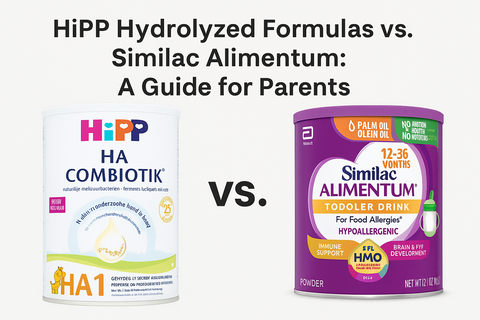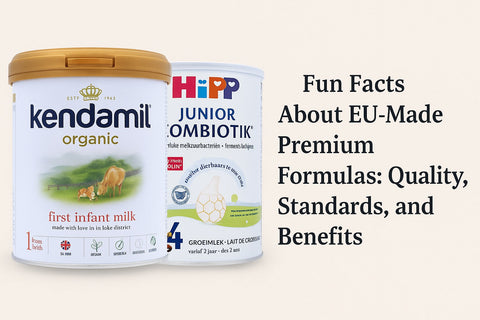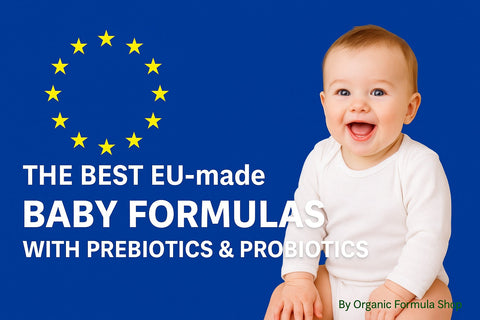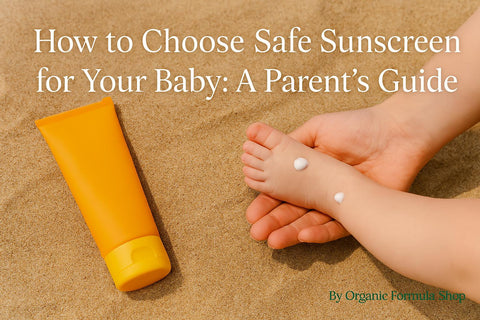Why Can't Babies Have Honey?
As parents start giving their babies solid foods, they come across several products they need to avoid, such as grapes and hot dogs (because they pose a choking risk), pure cow's milk (because it's hard to digest), and sugar-heavy desserts that are not recommended. But why is honey also kept away from babies? It's not because of allergies or choking concerns; understanding why is crucial for your baby's health. Honey is a renowned natural sweetener appreciated for its myriad health benefits. However, despite its nutritional value for adults, it's strictly off-limits for babies under one year old. This may surprise many, considering honey's wholesome reputation, but there are compelling reasons behind this precaution. Find out why babies can’t eat honey, and learn when it's safe to introduce the natural sweetener into their diet.

The primary reason behind the restriction on honey for infants is the potential risk of botulism. This is a severe illness caused by the bacterium Clostridium botulinum, which can attack the body’s nerves, according to the Centers for Disease Control and Prevention (CDC). This bacterium can exist in honey despite being in a dormant/not active state and poses a significant threat to an infant's underdeveloped immune system. Symptoms of infant botulism can appear hours to days after a baby ingests honey.
What is Infant Botulism?
Infant botulism is a rare but severe illness that occurs when a baby ingests the spores of Clostridium botulinum bacteria. These spores can grow and produce a toxin inside the baby's intestines, leading to botulism, which affects the nervous system. As this toxin enters the bloodstream, it affects the release of acetylcholine. This chemical messenger sends nerve signals to muscles, resulting in muscle control loss and can lead to paralysis and difficulty swallowing and breathing. Unlike adults, the digestive system of babies under one year of age lacks the maturity and strength to defend against these toxins, which can lead to this illness.
How is Botulism Contracted?
Botulism is contracted through the ingestion of Clostridium botulinum spores. These spores can be found in various environmental sources, including soil, dust, and honey. In the case of infant botulism, the primary route of contraction occurs when infants ingest the spores, which then germinate in their immature digestive systems, producing a toxin harmful to the body. While honey is one potential source, other substances like dust, herbal teas, and certain vegetables might also carry these spores.
Tips to avoid infant Botulism
Parents can protect their babies from potential illnesses by following these simple 5 steps.- Wash/sanitize your hands thoroughly and regularly.
- Ensure vegetables are properly cleaned and cooked before feeding.
- Avoid giving your baby honey or foods that might contain it.
- To avoid dust, taking your baby under 12 months of age out on a very windy day is not recommended.
- Prevent your infant from putting items from the ground into their mouth.
Symptoms of Infant Botulism

- Weak or altered cry: The baby might exhibit changes in their cry, sounding weaker or different than usual.
- Constipation: Babies affected by botulism often experience difficulties passing stools.
- Respiratory distress and possible respiratory arrest: In severe cases, botulism can lead to breathing problems, requiring urgent medical attention.
- Excessive Drooling: Babies may have trouble sucking or swallowing, leading to feeding difficulties and drooling.
- Droopy eyelids: A notable sign is the appearance of drooping eyelids or the inability to keep their eyes open.
- Lack of facial expression: Infants with botulism might have reduced facial movements, giving them a fixed or expressionless face.
- Weakened muscles or paralysis of legs and arms: Botulism can cause muscle weakness or paralysis in different parts of the body.
How is Botulism Treated?
Infant botulism is typically treated in a hospital setting under close medical supervision. The treatment primarily involves supportive care and specific therapeutic measures to manage the effects of the botulinum toxin on the infant's body. Here's an outline of the treatment for infant botulism:- Hospitalization: Infants diagnosed with botulism often require hospital admission for observation and specialized care.
- Botulism Antitoxin: In some cases, a specific antitoxin may be administered to counteract the effects of the botulinum toxin. This antitoxin is most effective when given early during the illness.
- Respiratory Support: Since botulism can weaken the muscles responsible for breathing, infants with severe symptoms may need assistance with breathing. Mechanical ventilation or respiratory support might be necessary until the effects of the toxin diminish.
- Nutritional Support: Botulism can affect an infant's ability to feed and swallow, leading to difficulties in nutrition and hydration. As a result, intravenous fluids or tube feeding may be required to ensure the infant receives adequate nutrition and hydration.
- Monitoring and Observation: Healthcare professionals closely monitor the infant's vital signs, muscle function, and overall condition throughout the treatment. This continuous observation is crucial for detecting and managing any complications promptly.
Prompt medical attention is crucial if an infant shows symptoms suggestive of botulism. Early intervention significantly improves the chances of recovery and helps prevent severe complications associated with the condition. Always seek immediate medical care if there's suspicion of botulism in an infant!
I Accidentally Gave My Baby Honey. Should I Be Worried?
If your baby accidentally consumes honey, it's natural to feel concerned, but the likelihood of developing infant botulism from a one-time exposure to honey is relatively low. However, monitoring your baby closely for any signs or symptoms of illness, such as constipation, weakness, difficulty feeding, or unusual sleepiness, is essential. Contact your pediatrician immediately if you notice any concerning changes in your baby's behavior or health after ingesting honey. While the risk is generally low, seeking medical advice promptly ensures proper evaluation and appropriate care for your baby's well-being.
When Can I Introduce Honey?

Pediatricians and health experts universally advise waiting until after the first birthday to introduce honey to a child's diet. By this age, a baby's digestive system is more mature and better equipped to combat the potential risks associated with Clostridium botulinum.
Conclusion
Although honey is known for its health benefits, it poses a significant risk to infants due to its potential for botulism. This rare but serious illness can have severe consequences for a baby's health. As parents, it's crucial to be aware of the risks associated with honey consumption in infants and to follow pediatric guidelines, ensuring that honey is introduced into a child's diet only after the first year of life. During a baby's first year, it's crucial to ensure their diet is free from potential risks, including avoiding honey. While feeding infants with European Organic Formulas from Organic Formula Shop, there's no need to introduce honey. These premium formulas from HiPP, Holle, Bebe-M, and Lebenswert are meticulously crafted with high-quality, organic ingredients, providing a balanced array of essential nutrients and vitamins necessary for a healthy start in life. By offering a safe, healthy, and straightforward feeding solution through these formulas, parents can rest assured that their little ones receive optimal nutrition without the concerns associated with honey consumption during infancy.
Contact
Contact our dedicated customer support team for expert advice and guidance tailored to your baby's needs. They have earned hundreds of 5-star reviews from our customers, helping you to provide the best nutrition for your little one. Contact us here or shoot us an email at support@organicformulashop.com. We're here to help!
Disclaimer
This article is no medical advice but is solely intended to provide additional information about this topic. Prompt medical attention is crucial if an infant shows symptoms suggestive of botulism. Early intervention significantly improves the chances of recovery and helps prevent severe complications associated with the condition. Always seek immediate medical care if there's suspicion of botulism in an infant!




